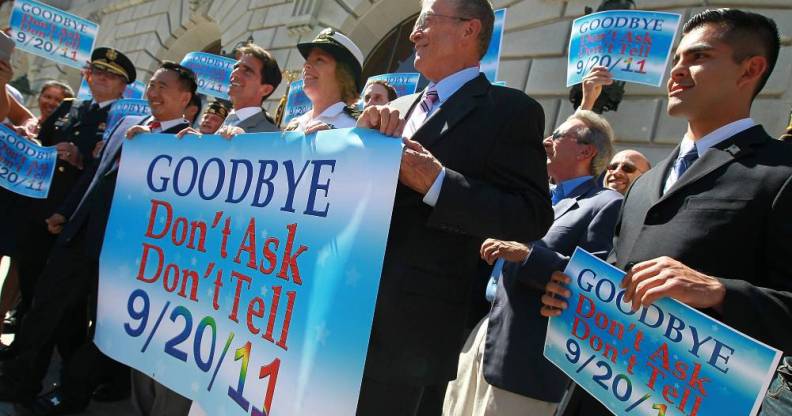LGBT+ service members discuss ‘hurtful’ legacy of reviled ‘don’t ask, don’t tell’ ban 10 years on

Local leaders and former military members hold a banner during a conference marking the end of “Don’t Ask, Don’t Tell” on 20 September 2011 in San Francisco, California. (Getty/Justin Sullivan)
Ten years ago, the US government repealed the vile “don’t ask, don’t tell” policy that prevented LGBT+ people from serving openly in the military.
“Don’t ask, don’t tell” (DADT) was instituted by the Clinton administration and went into effect in 1994 before being repealed on 20 September, 2011.
It prohibited LGBT+ service members from speaking about or disclosing same-sex relationships during their service while barring openly queer persons from applying to join the armed forces. Any service member faced being discharged if they disclosed their LGBT+ identity or same-sex relationships.
On the anniversary of its repeal, president Joe Biden, who has built his administration on LGBT-inclusive policies and appointments, spoke out against the “great injustice” that was “remedied” when DADT was killed.
He described in an official statement how its repeal lifted a “tremendous weight” off the shoulders of “tens of thousands of dedicated” US service members.
“The repeal of ‘don’t ask, don’t tell’, which formally barred gay, lesbian, and bisexual service members from openly serving, helped move our nation closer to its foundational promise of equality, dignity, and opportunity for all,” Biden said. “It was the right thing to do.”
“More than 100,000 American service members have been discharged because of their sexual orientation or gender identity,” he added. This included “some 14,000” under DADT itself
Many of these LGBT+ veterans received “other than honourable” discharges, cutting them and their families off from “vitally important services and benefits” for armed services members.
“On this day and every day, I am thankful for all of the LGBTQ+ service members and veterans who strengthen our military and our nation,” Biden added. “We must honour their sacrifice by continuing the fight for full equality for LGBTQ+ people, including by finally passing the Equality Act and living up to our highest values of justice and equality for all.”
Don’t ask, don’t tell remains a ‘hurtful’ legacy
In an interview with NBC News last year, Joshua Gravett described how, when he enlisted in the Army in 2003, he was forced to keep his sexuality secret for eight years. Now a sergeant first class stationed in Texas, he said he couldn’t have any type of relationship whatsoever because just being suspected of being gay could get a person discharged.
But then Obama signed the repeal bill in 2010, and it came into effect months later in 2011.
“I could just be myself without risking the loss of my career that I had already put almost a decade into,” Gravett said. “It was like a huge weight lifted off me.”
A decade since the discriminatory policy was overturned, Gravett said it remains a “hurtful” legacy in the armed forces.
Luccianny Melendez-Gomez told the Modern Military Association of America, a non-profit that advocates for LGBT+ veterans and their families, that she had met her wife while both of them served with the US Navy from 2007 until 2014.
Melendez-Gomez said her now-wife was actually her roommate during school, but they weren’t able to “share our relationship with the world” because of DADT.
“Like many other LGBTQ closeted members at the time, we were met with the conflicting notion that we could NOT do both, serve and love each other,” Melendez-Gomez said.
She said it was “still emotional” to think about the moment that “don’t ask, don’t tell” was repealed, and she said she felt “safe” and like she could “exist”.
“The closet we inhabited was shattered, torn down by progressive and inclusive change,” she said.
Progress in the military was reversed under Donald Trump, who instigated a ban on trans people in the military.
Biden used the 2020 anniversary of DADT repeal to pledge that he would overturn the ban if elected. He made good months later in one of his first executive orders in office, directing the Department of Defense to scrap the vile policy and revert to policies introduced during the Obama administration, allowing trans services members to openly serve in the military.

